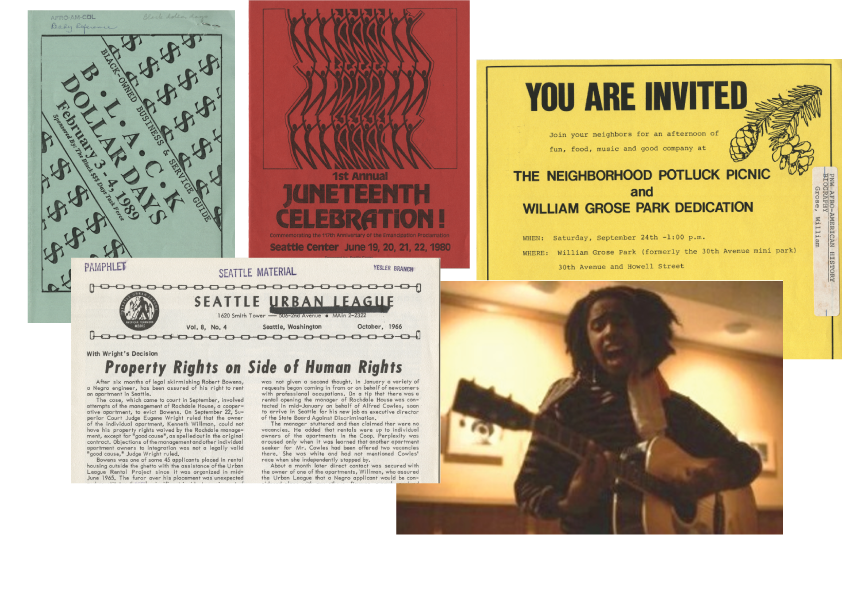
When Stephanie Johnson-Toliver found out about the Library bringing its African-American Ephemera Collection online, she said it made “the hair on the back of my neck stand up!”
In a good way.
As president of the Black Heritage Society of Washington State (BHS), she loves any effort that helps document, preserve, and promote local African-American history.
“If the Library has these collections … what better way to get it out more broadly than to digitize collections?” she says.
This Black History Month, you can check out the African-American Ephemera Collection for yourself. The Library has begun the process of scanning and uploading items from the collection in recent months for broader access.
The collection is composed of photos, community newsletter, and leaflets documenting local African-American history. In the last few months, Joe Bopp, Special Collections librarian, has scanned more than 240 pages, allowing material to be readily accessible on any digital device.
“It runs the full gamut of civil rights to community celebrations,” Bopp says.
Included are materials dating back to the 1950s, photos from Northern Lights Neon Naturals events – hosted by the Library to feature Black women performing and lecturing for the public in the early ‘80s – and a poster for the first known citywide Juneteenth celebration at Seattle Center in 1980. And Bopp has only scanned about 10 percent of the Library’s collection so far, with the intent of digitizing the entire trove over time.
The African-American collection occupies a unique place at the Library, having been officially launched with a donation of books by the Alpha Kappa Alpha Sorority, Inc. to the Douglass-Truth Branch (formerly known as Yesler) in 1965. Located in the heart of Seattle’s historically Black neighborhood, Douglass-Truth has housed the African-American Collection ever since. It has since grown to include the historic materials scanned in recent months, contributed by members of the community throughout the decades.
“It’s a reflection of the public’s trust in The Seattle Public Library as a historic repository for their culture and history,” Bopp says.
BHS also collects and preserves items from Washington’s Black history. Johnson-Toliver herself is a fourth-generation Seattleite whose great-grandparents migrated here from Mississippi and New Orleans. Preservation and digitization work often face barriers in funding and labor, she says – obstacles also reflected at the Library.
Johnson-Toliver says that BHS and the Library share a special relationship. BHS puts on an annual Black history display at Douglass-Truth every Black History Month – the display from February 2020 is still there, she says, noting that the pandemic shut down branches before they could disassemble the exhibit.
Additionally, BHS is working with King County Metro to add historical information to eight bus stops along the 23rd Avenue corridor in the Central District, including information about the history of the Douglass-Truth Branch at the bus stop across the street.
Local Black history is in high demand from area teachers and students, Johnson-Toliver says.
Bopp agrees, adding that the newly scanned items will show researchers that many of the issues debated today – policing, gentrification, and housing affordability to name a few – are “nothing new” and have been discussed for generations.
“When people come across this material, they are going to find a lot of conversations, celebrations, and issues within the greater Seattle community that are very relevant to conversations that we’re having today,” he says.
Find this collection online at this link.
This digitization work is made possible in part by donors to the Foundation.
The Foundation expresses its gratitude to the members of the Alpha Kappa Alpha Sorority, Inc. Delta Upsilon Omega Chapter and the Dynamic Urban Opportunities Foundation for their unwavering support helping build the African-American Collection at The Seattle Public Library.

